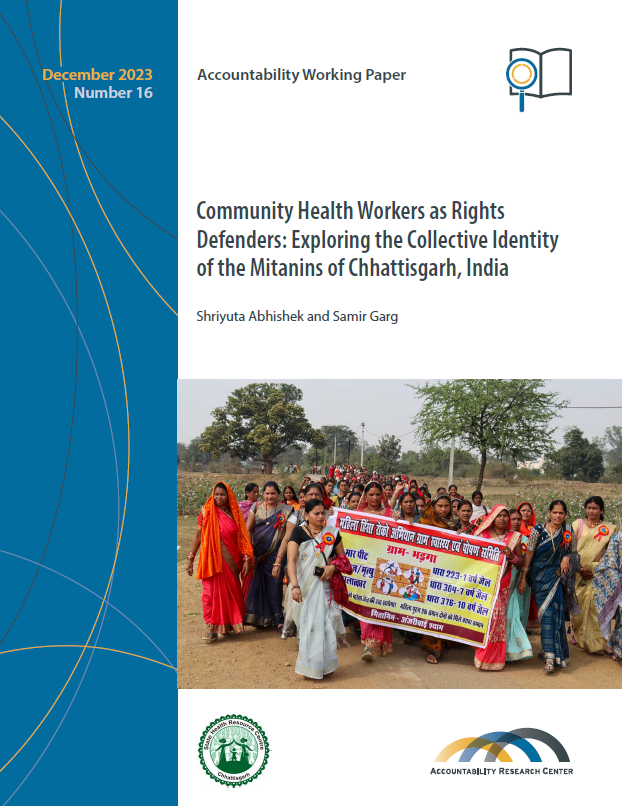
Community Health Workers as Rights Defenders: Exploring the Collective Identity of the Mitanins of Chhattisgarh, India
Date: December 2023
Author(s): Shriyuta Abhishek and Samir Garg
Publication type: ARC Accountability Working Paper
Published by: Accountability Research Center
This Working Paper discusses the Mitanin program, a state-run community health worker program in Chhattisgarh state, India. It is based on a year-long reflection and action research exercise by the implementing organization, the State Health Resource Centre (SHRC).
It argues that the collective identity of these community health workers (Mitanins) is central to their work defending the social and economic rights of their community. Collective identity often plays an important role in social movements for people’s economic and political rights. However, government-funded workers rarely get involved in such movements. The authors wanted to understand whether collective identity plays a role in driving the multi-issue activism of community health workers.
A composite definition of this collective identity emerged from the research. Throughout the interviews and discussions, the Mitanins described their collective identity as a sense of solidarity that all Mitanins share with the community they serve and belong to, and a feeling of sisterhood with other women and each other. It is the shared experience of being a group of empowered women with a common mission who must use their knowledge and compassion to support the people they serve. The value system underpinning their mission dictates that people should not be denied their rights.
The Mitanins’ collective identity is layered; they are not merely frontline health workers, but women who care deeply about their community. They are problem-solvers, activists, and community leaders. Their collective action and collective identity as women leaders in solidarity with the community is mutually reinforcing, and has enabled them to undertake multi-issue activism and transform themselves into frontline rights defenders.
The authors conducted a state-wide survey along with focus group discussions and in-depth interviews. The survey (n=558) aimed to establish what proportion of Mitanins are involved in multi-issue activism. It found that in the preceding three years, 84 percent had taken rights-based action in at least one of three domains: food security and nutrition (68 percent); healthcare (56 percent); and gender-based violence (21 percent). They refer to these actions as ‘rights-based’ because they involve negotiation and confrontation with local elites and government officials, as well as writing formal complaints to government officials. Other than rights-based actions, Mitanins also provide information to community members about their rights and entitlements to health programs, food security, and nutrition under government programs—information that is often not readily accessible to poor people in India.
This paper analyzes the patterns of autonomous collective action through discussion, interviews, and the rights-based songs and slogans written by Mitanins. The authors argue that the Mitanins’ collective identity was formed due to two main factors: the program’s movement-building approach; and the degree of autonomy enjoyed by Mitanins. The movement-building approach nurtured the activist tendencies of Mitanins, and the voluntary nature of their work allowed them to retain their autonomy vis-à-vis the health system bureaucracy
Shriyuta Abhishek is a researcher and practitioner. She has more than three years of experience with public health practice and research with grassroots organizations in Maharashtra and Chhattisgarh. At the time of writing, she was working at the State Health Resource Centre in Chhattisgarh. Her work focuses on the Mitanin program and its intersections with the social determinants of health, community participation in health, primary health care, and publicly funded health insurance.
Samir Garg is a researcher and practitioner. His work has been focused on strengthening health systems and food security programs, including as an adviser to Supreme Court Commissioners on the right to food in India. He worked for the State Health Resource Centre in Chhattisgarh and engaged with the Mitanin program for almost 20 years. He has a PhD in health systems management. His areas of interest are community participation, primary health care, and management of public systems.
